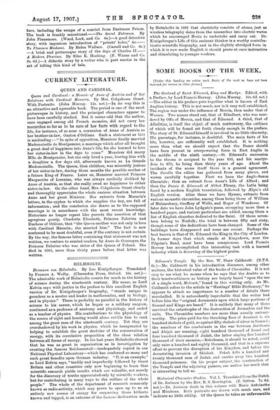HELMHOLTZ.
Hermann von Helmholtz. By Leo Konigsberger. Translated by Frances A. Welby. (Clarendon Press, Oxford. 165. net.)— The admirable work of Helmholtz counts for much in the history of science during the nineteenth century. His name, as Lord Kelvin says with justice in the preface to this excellent English version of Dr. Konigsberger's biography, " stands unique in grandeur as a master and leader in mathematics, and in biology, and in physics." There is probably no parallel in the history of science to his career, which he began as a military surgeon, continued as a professor of anatomy and physiology, and ended as a teacher of physics. His contributions to the physiology of the senses of sight and hearing would alone entitle him to rank among the great men of the nineteenth century. Yet they are overshadowed by his work in physics, which he inaugurated by helping to establish the great doctrine of the conservation of energy, with its correlative proposition of the close relation between all forms of energy. In his last years Helmholtz showed that he was as great in organisation as in investigation by creating the famous Reichsanstalt—inadequately copied in our National Physical Laboratory—which has conferred so many and such great benefits upon German industry. "It is an example," as Lord Kelvin says, "tardily and imperfectly followed by Great Britain and other countries only now beginning to learn that scientific research yields results which are valuable, not merely for the discovery of truths appreciated only by scientific workers, but for contributing in many ways to the welfare of the whole people." The whole of the department of research commonly known as radio-activity, which may prove to open up to us an entirely new source of energy far surpassing those hitherto known and tapped, is an outcome of the famous declaration made
by Helmholtz in 1881 that electricity consists of atoms, just as wireless telegraphy dates from the researches into electric waves which he encouraged Hertz to undertake and carry out. Dr. Konigsberger's Life of this eminent thinker is a worthy contribu- tient° scientific biography, and in the slightly abridged form in which it is now made English it should prove at once instructive and stimulating to younger workers.


































 Previous page
Previous page